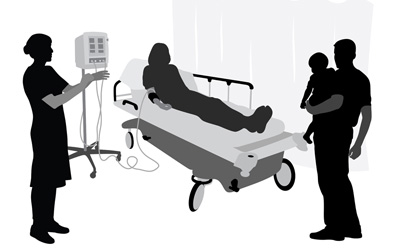How it began…
Loretta Ford, a well known nurse practitioner in the United States, began the nurse practitioner movement in the early 1960s and paved way for nurse practitioner education on a national level. Her efforts to promote specialized nurse practitioner training helped empower many nurses. Today, there are over 140,000 nurse practitioners who are providing healthcare services in various capacities.
Why you should become a family nurse practitioner?
There are many reasons why individuals and practicing nurses are pursuing family nurse practitioner degree programs. The health industry is booming due to an ageing population, rising demand for health services, and greater availability of health insurance coverage. As more people are seeking healthcare services, the demand for nurse practitioners is increasing. These professionals have advanced nursing qualifications and are certified to provide primary healthcare to patients. Here are some reasons why you should become a family nurse practitioner:
-
Positive employment prospects – The demand for FNPs is steady in healthcare settings.
-
Work directly with patients – NPs is the closest you can get to being a doctor without actually becoming one, and can treat patients directly.
-
Sense of achievement – As an FNP, you can help patients on a daily basis.
-
Salary potential – Generally, NPs qualify for a higher income as compared to registered nurses or licensed practical nurses.
-
Work settings – FNPs can work in different healthcare settings such as clinics, hospitals, community health centers, etc.
-
Impact your community – By helping one family at a time, you can make a huge difference in your community.

What do FNPs do?
From treating serious medical conditions to mild illnesses, FNPs are trained to deal with a wide range of health problems. Here are some of the main job duties of an FNP:
-
Develop treatment plans
-
Educate and guide patients
-
Perform diagnostic tests
-
Manage patient care
-
Prescribe medications
-
Provide preventive care
How to become an FNP?
The state requirements to becoming an FNP may vary. But generally, the following steps must be completed to become a family nurse practitioner:
-
Become a registered nurse
-
Earn a bachelor’s degree
-
Work as a registered nurse
-
Complete a family nurse practitioner masters program
-
Get certified in your state
Master of Science in Nursing – Family Nurse Practitioner Degree
This program is designed to prepare registered nurses for the role of an FNP. The program will focus on academic knowledge as well as clinical skill development. Students enrolled in this program will explore various nursing theories, learn about evidence-based practice, and conduct research.
The curriculum will include a number of courses that will highlight different aspects of advanced nursing practice. Students will learn about disease management and health assessment techniques. The courses typically covered in the program are:
-
Advanced health assessment and clinical reasoning
In this course, students will learn how to differentiate between normal and abnormal findings using various assessment techniques. Topics such as disease prevention strategies, clinical reasoning, and case studies are covered.
-
Pharmacology for nursing care
This course will help students extend and build their knowledge of pharmacology. The main focus of the course will be on complex drug regimens, drug therapy, illnesses across the human lifespan, and pharmacological interventions.
-
Advanced physiology and pathophysiology
In this course, students will gain an in-depth understanding of advanced concepts of physiology and pathophysiology. Topics such as the following will be covered: autonomic nervous systems, skeletal systems, organ systems, respiratory systems, and more.
-
Advanced practice nursing in primary care of the adult
This course will provide students with knowledge of common chronic and acute health problems among the adult population.
This course will help students develop a solid basis for clinical reasoning and practice. Students will learn about pathophysiologic processes, human anatomy and research findings, and diverse populations.

How long does it take to complete a master’s degree in family nurse practitioner program?
It typically takes two years to complete an FNP masters program. You must earn a minimum number of credit hours (50-60 coursework credits and 500-600 clinical hours), and complete all the program components within the given time frame. The credit hour requirement may vary from state to state.
Can you get an online family nurse practitioner degree?
Yes, you can earn an FNP degree online. Many schools are offering hybrid FNP programs. In a hybrid program, you can complete the theoretical portion of the program online with the help of tutorials, online lectures, and conferencing. However, you will be required to take a few classes on-campus for training purposes. Online education is suitable for individuals who are working and are looking for a flexible mode of study.
Admission requirements
The admission requirements will vary from college to college. Generally, applicants are required to submit the following:
-
Transcripts of an undergraduate degree in nursing
-
Nursing license
-
Graduate school application
-
A minimum GPA of 2.75
-
Personal statement
-
Current resume
-
Letters of recommendation
-
Background check and drug screening
Family nurse practitioner certificate
A certificate program can help broaden your knowledge and equip you with skills to excel in the nursing field. Family nurse practitioner certificate programs are short courses that can be earned in 6 to 12 months. The coursework will include a set of specialized courses that cover family nursing concepts in detail. Some of the courses covered in the program include:
-
Health promotion
-
Pharmacology
-
Disease management
-
Health maintenance
A number of colleges are offering post-graduate and graduate level family nurse practitioner certificate programs. You can also pursue this program online.
Certification
After completing a master’s program in FNP, you can apply for certification in your state. The American Nurses Credentialing Center (ANCC) is currently offering the FNP board certification. This is a basic FNP certification that has a validity period of 5 years. The eligibility requirements include:
-
RN license
-
Masters or post-graduate degree in FNP
-
Completion of 500 supervised clinical hours
You can check with ANCC to find out more about the certification requirements.
Career prospects
FNPs can work in different healthcare settings such as clinics, private homes, hospitals, and even schools.
The income level will depend on a number of factors such as employer organization, state, and certification.